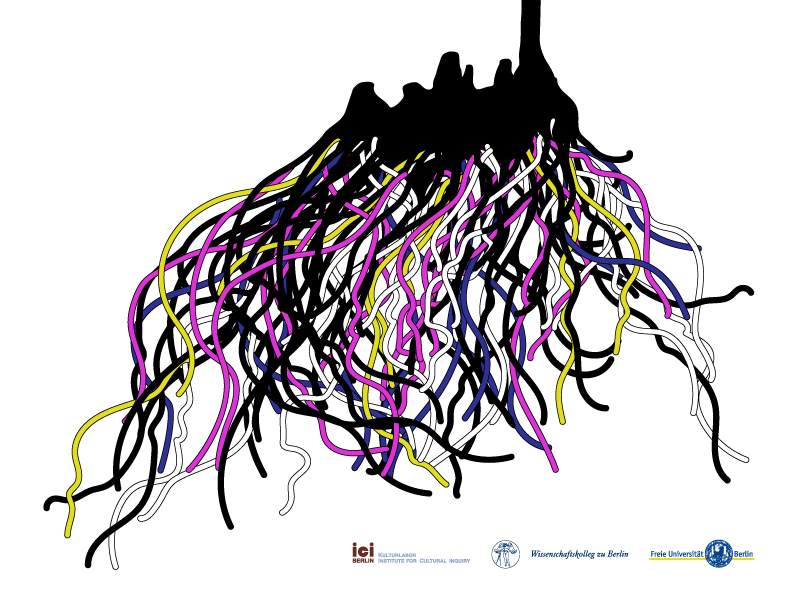Workshop
Update: Both workshops are now fully booked.
The symposium will be preceded by a workshop day for junior researchers on March 22, 2018. This is an opportunity for pre- and postdocs to discuss issues of language and publicness, share their work, and expand their methodological skillset.
Participation is free (accommodation and travel costs are self-paying); places are limited. All participants will be welcome to attend the entire symposium.
How to apply? We invite informal applications including your short CV (2 pages max), a brief description of your PhD or postdoc project, and a statement explaining your interest in the workshop. The workshops run in parallel, so please indicate which one you would like to attend.
Please send your application via email to the conference organizers (theresa.heyd@fu-berlin.de, britta.schneider@fu-berlin.de). Deadline: December 31, 2017.
For further information, feel free to contact us.
Workshops:
- Ethnographic approach to digitally mediated publics
Piia Varis, Tilburg University
This workshop focuses on the implications of digitalisation for doing ethnographic research, and for how we conceptualise the ‘public’. The session is divided into two parts. The first part is a more theoretical introduction to digital ethnographic research, and digitally mediated publics. In the second part we will focus on analysing specific digital practices (Jones et al. 2015) and how particular kinds of knowledge and expertise are legitimated in digitally mediated (micro-)publics, specifically on social media. As digital media has enabled the visibility, and perhaps also the proliferation, of different forms of knowledge about health, healthy living and wellbeing, we’ll take health discourse as an example of how social media function as loci for new kinds of expertise and publics. We’ll pay specific attention to the role the affordances of social media play in the configuration of publics, and in the legitimation and (in)visibility of certain types of knowledge online. The workshop is suitable for junior researchers interested in digital ethnographic research, and analysis of social media discourse.
References
Jones, Rodney H., Alice Chik & Christoph A. Hafner 2015. Introduction. Discourse analysis and digital practices. In Jones, Rodney H. et al. (eds.) Discourse and digital practices. Doing discourse analysis in the digital age. London: Routledge, 1-17.
-
Quantitative Approaches to Discourse on Social Media
Tatjana Scheffler, University of Potsdam
Social media such as Twitter, Facebook, blogs, forums, etc. are an abundant data source for texts generated by a diversity of users online. This provides unique opportunities and challenges for linguists and social scientists working with textual data. In this workshop, we address some of the specific challenges posed by social media data: For one, the large amount of data necessitates automatic methods for collecting and storing texts, as well as quantitative approaches to analyzing the resulting corpora. In addition, the language in social media contains many non-standard features which on the one hand, may prevent the use of established tools for natural language processing, and on the other hand, may themselves constitute exciting opportunities for research. In particular, the conversational nature of many kinds of social media draws attention to our lack of theoretical and practical knowledge about how to model dialog and discourse (as opposed to monological texts).
In this workshop, we will present methods from computational linguistics and computational social science that enable the collection and analysis of large corpora of social media data, with a particular focus on interactive language. The workshop is aimed at young researchers who want to start working quantitatively with social media data. Since we do not assume programming abilities, the focus will be on available tools and methods for computational linguistic analysis that are approachable for social scientists and can be immediately applied to your next research project. In addition, we will discuss state-of-the-art analyses of the nature and variability of language on social media and approaches to using social media data as a sensor for non-linguistic social data (e.g., health, human well-being, or politics).
Topics covered will include:
- What is computational linguistics/natural language processing?
- Collecting social media corpora
- Working with non-standard language
- Computational social science: detecting user properties
- Discourse structure of social media multilogs
- Available tools and methods
Finally, we will give pointers to tutorials that introduce social scientists to scripting languages like Python and the basics of programming and allow you to implement even more powerful analyses.
